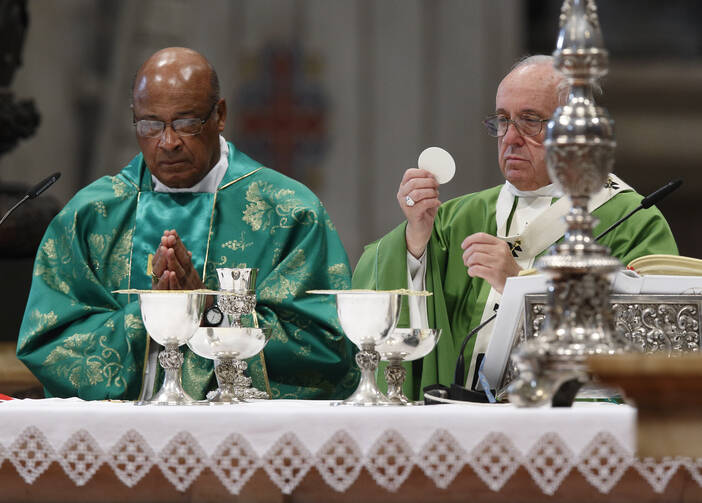Apart from a short statement on the Southern African Catholic Bishops Conference website, a few mentions in the national Catholic newspaper Southern Cross and a series of reflections done by the Jesuit Institute South Africa, Pope Francis’ “Amoris Laetitia” has not made a very big impression in South Africa. A number of priests I’ve spoken to have not even read the post-synodal exhortation.
Why is there so little response?
We can discount at once the suggestion that the church is too busy trying to get President Jacob Zuma to step down. That’s not happening, apart from a handful of church leaders who are working with civil society groups.
Could it be that the South African church actually rejects the document and the reforms that Francis is instituting, in effect “sitting out” this pontificate? Or perhaps that it is simply indifferent? It is true that many priests in South Africa and the rest of the continent are unimpressed by Francis’ call to renewal—they enjoy (too much, I believe) the elevated “chiefly” status given them by many faithful, with accompanying privileges, endorsed by pre-Vatican II theologies of priesthood still heard in many African seminaries. In practice, however, many clergy actually do what Francis asks of them in “Amoris Laetitia” already—resolving difficulties pastorally, even if the theology of conscience is not widely taught in parishes.
Similarly, do a laity still heavily influenced by the more doctrinally-focused tone of Francis’ predecessors find this reform confusing—apart from a minority who (with varying degrees of vocality) actually want reform? I don’t think so because at the grass-roots level many laity have quietly made up their own minds about many issues in the church. The people may affirm what Father says, but then do what they wish. The common process of marriage in Africa involves engagement and the provision by the groom of lobola, the bride’s dowry that must be paid to her parents before they are triply married—according to African custom, civilly and then in church. This is true for most Catholics as it is for the rest of Africans in general.
Frequently once the engagement begins the couple live together, often starting a family. For some this creates a crisis of conscience—for others not. Some may not receive Communion during this period—others carry on as before. More often than not they don’t seek advice of their parish priest, and most priests don’t offer advice unsolicited. Custom trumps church polity.
What, then, of possible indifference? Despite a net numerical increase, the Catholic Church has declined since 1980 in percentage “market share” of South Africa’s population. Pentecostal and African Initiated Churches, as well a growing “not religious” minority, have whittled away at the European-founded churches that were once hegemonic in the country. The “emigration” of many Catholics to A.I.C.'s, agnosticism or other countries may account for some of this, but I would speculate that those who remain are not indifferent, whether they support Pope Francis and his reforms or not.
A deeper reason may account for what I observe, one that has less to do with our response to the exhortation’s content than with how it—and other church documents—has been presented to the public.
Perhaps, ultimately, the limited reception of “Amoris Laetitia” is the result of its actual form. Though its language is clear, it is long: over 250 pages! South Africa is not a reading culture. Publishers tell me that a local book selling a few thousand copies is considered a bestseller. Most Catholics don’t read theology. From informal observations, I fear this often extends to many clergy once they are ordained. Moreover, though widely spoken, English is a second, third or fourth language for most people. In such a situation a work like “Amoris Laetitia” is unlikely to be widely read. I suspect the same is true throughout Africa and other parts of the world.
If he wants it read, I think Pope Francis, his advisors and the S.A.C.B.C. should consider new publication strategies: edited versions, sound-byte size texts, possibly disseminated through social media, and translations into the local vernacular. The important message of texts like “Amoris Laetitia” should not be obscured by the medium through which it is disseminated.
Anthony Egan, S.J.,is one of America's Johannesburg correspondents.








